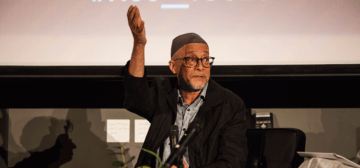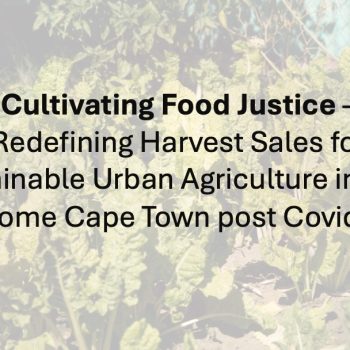African Centre for Cities International Urban Conference
To celebrate the ten-year anniversary of the establishment of the African Centre for Cities at the University of Cape Town, the International Urban Conference draws together leading urban scholars and practitioners from all corners of Africa and the world to take stock of ground-breaking urban research, to explore new avenues for enquiry and collaboration, and to make visible the vibrant state of our broad and heterogeneous field.
The conference takes place from 1 to 3 February 2018, at the University of Cape Town, South Africa.
With nearly 300 individual papers, over 80 panels and close to 20 roundtables, the conference will provide an opportunity to engage with the scale and breadth of African and southern urbanism, which calls for comparative readings of cities, alternative modes of inquiry and new geographies of theory.
The programme will engage with diverse readings and conceptualisations of African cities, their micro-realities and complex dynamics, and their relationships to national, regional and global debates and contentions.
A key component of the conference is a series of curated keynote sessions featuring leading scholars and cutting-edge practitioners. These include Gautam Bhan, Filip de Boeck, Sammy Baloji, Alcinda Honwana, Achille Mbembe, Joy Mboya, Raúl Cárdenas Osuna, Vyjayanthi Rao, Aromar Revi, AbdouMaliq Simone, Eduardo Morena, Teresa Caldeira, Jennifer Robinson, Carlos Lopes and Max Michael Uwemedimo.
A series of themes structure the various panels and roundtables:
Governance, Planning and Politics focusses on sector specific questions of governance and management (for instance water, land, health, mega projects, transport, law, conflict, traditional authorities) and that engage with broader debates on the state, power and politics.
Justice, Rights and Change in the City engages with global urban policy processes such as SDGs, the New Urban Agenda, as well as aid and donor practices. These panels open up debates on development, justice, and the right to the city.
Infrastructure, Resource Access and City Development engages with concrete questions of infrastructure, its form, access and implementation. These sessions also explore infrastructure as an interface between states and citizens, and as sites for theoretical engagement.
Feeding the City deliberates on innovative research on food insecurity in African cities that forefront the urban and questions of distribution, access and survival. These panels will also chart agendas for future food research in contexts of growing insecurity and precarity.
Rethinking the African City engages with why African cities matter for theory. This theme innovatively explores new geographies of theory that ‘place’ African cities in the world and rethink north/south binaries.
Urbanisation and Economies examines urbanisation and economic dynamics, engaging with questions of economic growth, industrialisation and labour. Panellists tackle challenges of unemployment, economic growth, and ways to make cities inclusive.
Climate, Resilience and Sustainability examines the realities of climate change and its urban dimensions. This theme will debate realities of risk and practices of resilience with a critical focus on sustainability, its governance, and politics.
Knowing the City? Methodology and Trans-Disciplinarity begs the question ‘How do we conduct meaningful research with impact?’ Panels share experiments with method and pedagogy, which help recast and address pressing urban crises. Panels engage the multiple publics that shape our cities and urban debate and which are central to trans-disciplinary forms of urban research and knowledge.
Everyday City Life: Identities, cultures and livelihoods presents critical issues of diversity and belonging that shape everyday city life for people. These panels bring to the fore everyday practise, the intimate and the micro, and the creative ways in which people make livelihoods and access the city. This theme surfaces contestations and displacements as well as the politics of city development in the everyday.
Imagining the Urban Past and Present: Architecture, Design and Art engages with the formal and informal built environments, with architectural and design practice, and with contestations of place-making. By definition inter-disciplinary, these panels rethink the ways in which we bring culture, heritage and economy together in cities.
Professional Practice, Networks, Publishing draws together experience and practice in academia, journal publishing, and cultivating professional and peer-to-peer networks.
CONFERENCE PROGRAMME
The programme overview of the conference is available for download here.
The detailed programme with more information on panel sessions and roundtables is available for download here.
ABSTRACT BOOK
You can download the abstract book of the conference here. Updated 22 January 2018.
KEYNOTE BIOGRAPHIES
Learn more about our keynote speakers here.
PARTICIPATION LIST
To facilitate networking here is a list of participants in the conference.
VENUES
The conference takes place on Upper Campus at the University of Cape Town. All plenary sessions will be hosted in the New Lecture Theatre, while parallel panel sessions and roundtables will take place in the Leslie Social Science Building and Centlivers Building.
Consult the Campus Guide for maps of the campus.
REGISTRATION FEES*
Delegates from outside Africa (not a full time student) ZAR 3000
Delegates from Africa (not a full time student) ZAR 2500
Full time student based at academic institution outside Africa ZAR 2000
Full time student based at African academic institution ZAR 1500
*Please note these fees do not include 14% VAT.
THE CONFERENCE HAS REACH MAXIMUM CAPACITY. REGISTRATION IS NOW CLOSED.
- If you are a participant (with your abstract already submitted and accepted as part of the conference programme) register here. Registration for this event is now closed.
- If you are an attendee, register here. Registration for this event is now closed.
FUNDING
Eight Conference Fellowships are available for full time students based at African academic institutions who are presenting a paper at the conference (with the abstract already submitted and accepted as part of the conference programme). The fellowships are made possible by the International Journal of Urban and Regional Research (IJURR), and The IJURR Foundation. To apply fill out the special section in the registration form.
ACCOMMODATION & TRAVEL
We recommend preferred supplier Flywell Travel for accommodation or travel queries.








